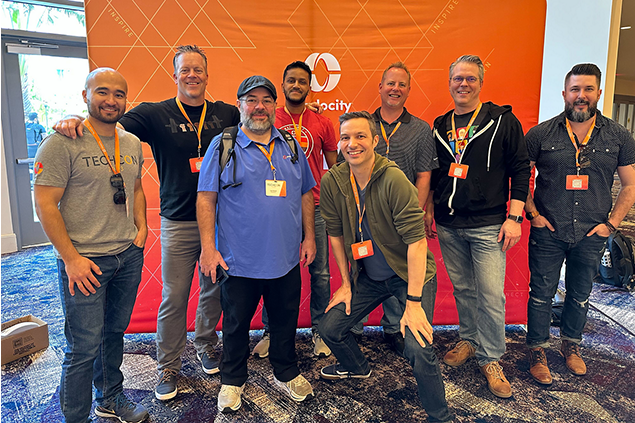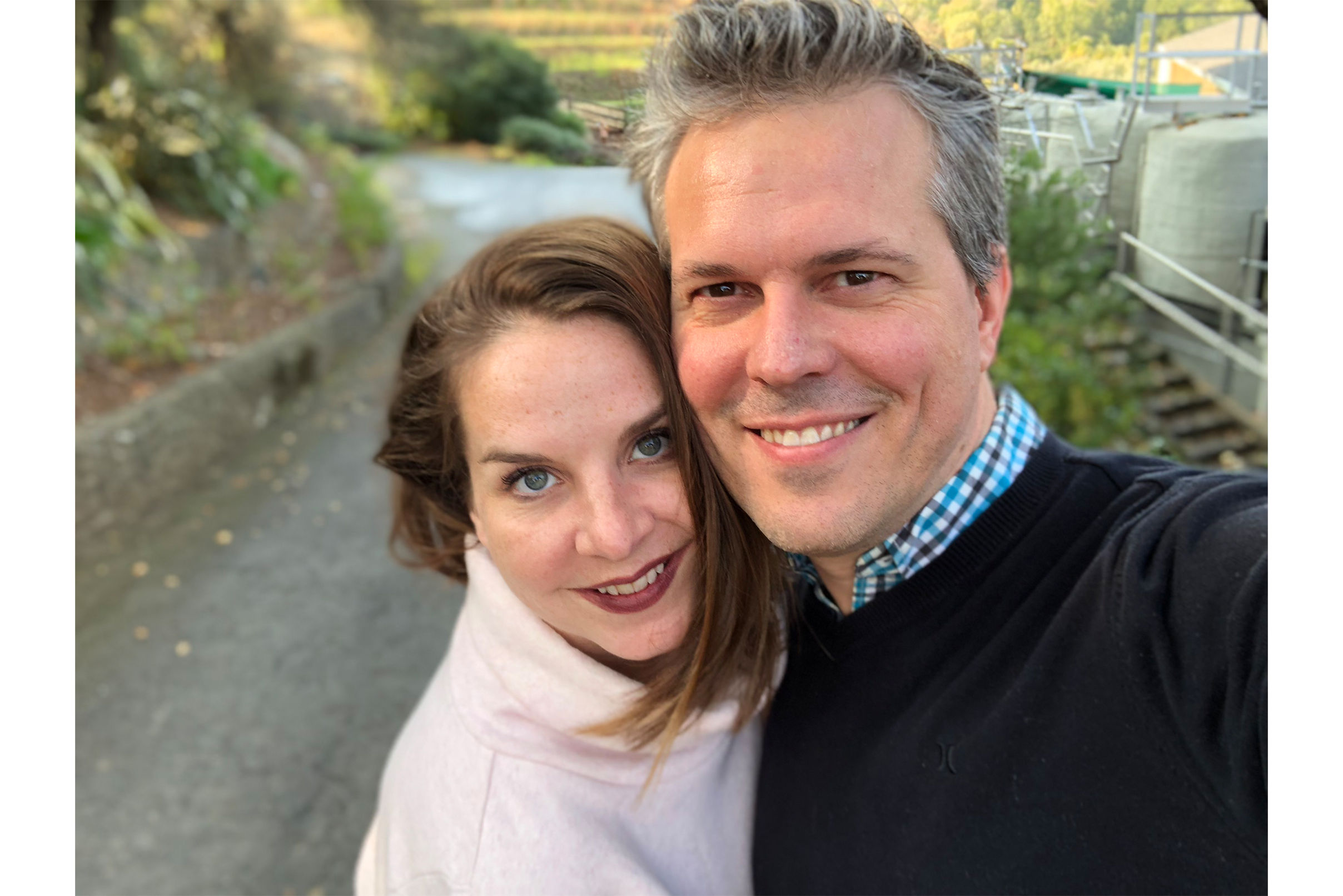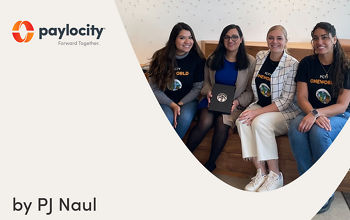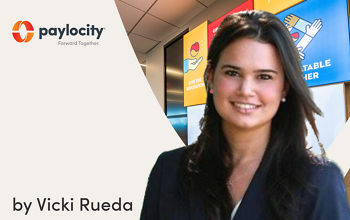resources
A Culture of Caring
March 20, 2024
We all want to feel supported at work, but sometimes the scope of that support isn't visible until we find ourselves in crisis.

March is Colorectal Cancer Month, and although I hadn't given it much consideration before, it's been at the forefront of my thoughts in recent months. When I got diagnosed with Stage 3 colon cancer in December 2023, it was a complete surprise. I hadn't detected any symptoms (which can include constipation, diarrhea, bloody stool, unexplained anemia, bloating and abdominal pain, and unexplained weight loss). At age 48, I also wasn't yet at the medically recommended age of 50 for getting screened. Then I learned I'd need to undergo months of radiation treatment and chemotherapy before they could operate due to the location of the tumor. Life suddenly looked quite different.
I started at Paylocity in 2020, at the onset of the Covid pandemic, having just been furloughed from a small consulting firm. I was looking for an employer who was big enough to offer stability and solid benefits, while not being so big that I'd feel like just a cog in the machine. I watched and listened with interest as our CEO and leadership team shared their strategy on biweekly, company-wide video calls, quickly pivoting to conserve cash and pare back spending in response to the uncertain economic climate. They emphasized the importance of each measure to the goal of No Layoffs, which was obviously reassuring for me.
During onboarding, I reviewed the list of benefits. Everyone gets employer-paid Short-Term Disability at 50% of their salary through Aflac. For just a few dollars per pay period, employees have the option of boosting that amount up to 67% or 75%. While I'm an optimistic guy at heart, I'm also a pragmatist, so I enrolled for the top amount "just in case" and because it was affordable. That turned out to be a smart choice. When I began medical leave this January, I only needed to spend a few days of earned Sick or PTO (Paid Time Off) and was able to cover the rest of as Short-Term Disability, which meant I would continue receiving paychecks at not much less than my regular take-home pay.
In mid-January, my surgeon called and said they took another look at my scans and determined the location of the tumor was high enough to go ahead and operate. (The procedure is officially “Laparoscopic Assisted Robotic Lower Anterior Resection” -- though when the admitting nurse asked me to confirm what I was there for, I just said "Rectal Robots".)
As I prepared to step away from the software engineering team I manage and into the hospital for surgery, my manager, Christopher Story, Associate Director, asked how he could help and assured me that my colleagues would be eager to show their support – perhaps through DoorDash or UberEats gift cards. Since we live on a lake in the woods of northern lower Michigan, we happen to be just out of the range of all delivery services, whether for meals or groceries. So, I let Chris know that we would gladly use gift cards for our grocery shopping at Aldi or Costco, and then crossed my fingers that we might get maybe $250. (I had just coordinated the collection of some gifts for a colleague with a new child, and that amount would have been in line with the few hundred we collected towards their baby registry.)
I was released from the hospital after two nights and was then able to continue recuperating in my own bed at home. Each day, I worked to walk further and without assistance – though for the first few days it felt as if there were knives cutting across my insides with every step. My mom had driven up from Ohio to help during my recovery, and in the middle of my first week home — at about the time I could make it down the hallway and into the kitchen without crippling pain — she alerted me to the arrival of a package with my name on it.
As I write this, I'm feeling again the emotions of opening that package. The first thing I saw was a pair of Paylocity mugs. (Who doesn't love corporate swag, am I right?) Then I opened the card inside and found two pages of get-well messages from some 20 colleagues alongside a thick bundle of gift cards worth a combined $1,400. With my mouth agape, I looked up at my mom's face to see tears in her eyes.
We all want to feel supported at work, but sometimes the scope of that support isn't visible until we find ourselves in crisis. I work with a talented team, and I get great support in my job duties from my manager and his director, so I had no doubts that the work I was leaving aside for several weeks would be capably moved ahead. But the outpouring of love and support represented by these notes and the generous financial contributions overwhelmingly showed me and my family that our work family puts its people first. Many companies will boast of a culture like that, but here was tangible evidence of that value in action.
I'm writing this not just to share how much I appreciate my colleagues and my company culture but also to say that if you're getting into your 40s, it's time to start thinking about screening for colorectal cancer. Let me close with some stats from the American Cancer Society:
- In 2024, there were about 106,590 new cases of colon cancer (54,210 in men and 52,380 in women)
- Additionally, there were about 46,220 new cases of rectal cancer (27,330 in men and 18,890 in women)
- In people younger than 55 years of age, rates have been increasing by 1% to 2% a year since the mid-1990s.
Updated guidelines now call for screenings starting at age 45 instead of 50, with the goal of earlier detection and improved outcomes. If I had waited two more years until I was 50 years old, there's no telling if the surgery would have gotten all of it. But tests on the 16 lymph nodes removed by the “Rectal Robots” during my operation show that I'm cancer free, with no need for radiation or chemotherapy.
No one likes the process of getting a colonoscopy, but there are also non-invasive screening options, including an at-home stool test (which is how my physician determined a need for a closer look). A number of friends and family I shared my story with told me that they were going to go ahead and arrange for screening, which is the best possible outcome from this story, and I hope when it's time that you'll do the same!





